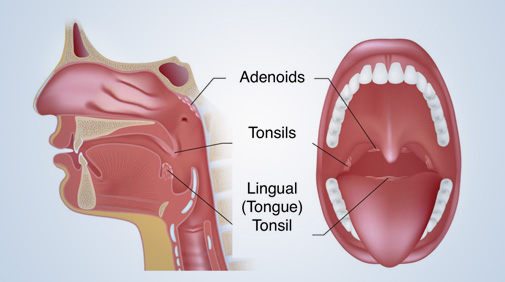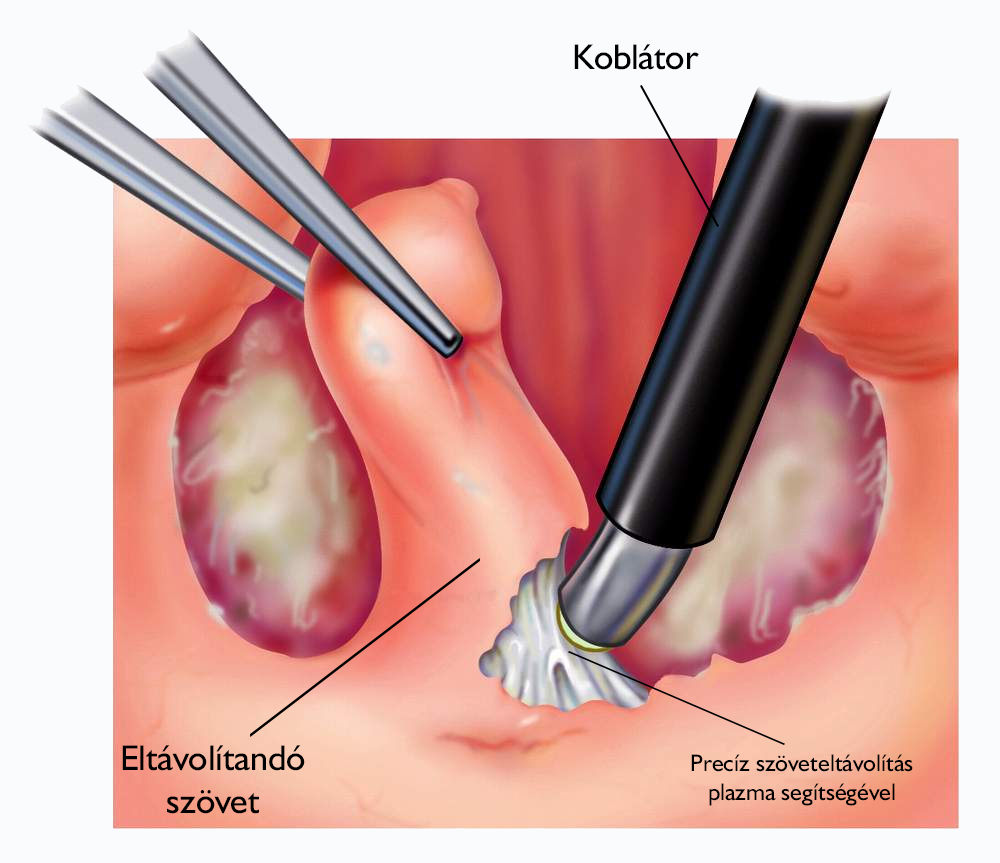Tonsillectomy
Tonsils are lymphatic tissues located deep in the oral cavity, on either side of the throat.
As part of the ring of lymph tissue (Waldeyer’s ring) in the oral cavity and pharynx (this includes the adenoids, lingual tonsil, the lymph tissues in the pharyngeal and maxillofacial mucosa), the tonsils are important factors in controlling infections, and they are the first immunological screening station of infections targeting the body.
When is tonsillectomy necessary?

Removal of tonsils is recommended in the case of acute tonsillitis occurring several times a year and causing high fever and severe sore throat. In case of an abscess around the tonsils, surgery is mandatory.
In case of chronic tonsillitis and “focal” tonsil, surgery is warranted, both in adulthood and in childhood. In this case, painful inflammation of the tonsils is less common or not at all, and a feeling of discomfort in the throat may occur. Prolonged inflammation in the tonsils can cause increased hair loss, joint complaints, skin rash, fatigue, recurrent fever, bad breath and inflammation of other organs (e.g. kidneys, heart).
Significantly enlarged tonsils can narrow the throat, causing difficulty swallowing and/or breathing and they also contribute to the development snoring and nocturnal respiratory failure (obstructive sleep apnoea syndrome – OSAS). In this case, it may be necessary to remove the tonsils.
After tonsillectomy, the body is able to fight infections because there is enough lymph tissues left in the mouth and throat.
How is the intervention performed?
Tonsillectomy is the surgical removal of the tonsils and is often performed with the removal of the adenoids (adenoidectomy). The duration of tonsillectomy is about 40 minutes, the procedure is performed under general anaesthesia, usually under antibiotic protection. In case of high-risk anaesthesia (old age, serious illness) or on request, we perform the surgery under local anaesthesia.
There are several ways to remove the tonsils, in the case of the classical method, the tonsils are “shelled” mechanically, with a metal raspatory, removed with the help of a tonsil loop, and the haemostasis is done with an electrocautery. Tonsil extenuatory surgery is usually performed with a laser or radiofrequency procedure, but our hospital also has options for a state-of-the-art, so-called coblation tonsil surgery.

Why is coblation tonsillectomy more effective than conventional surgery?
With coblation technology, a focused plasma allows precise removal of tissues at low temperatures (40-70 C), resulting in smoother anatomical surfaces and a thermal load on the surrounding tissue compared to conventional monopolar diathermy devices or mechanical cutting devices. The plasma technology procedure reduces the time of the operation, the pain after the surgery is milder and the post-bleeding complications are less frequent.
All types of tonsil surgeries can be performed on children, which is available in our Hospital over the age of 3.
What are the risks and advantaged of the intervention?
Risks:
As with any surgical procedures, tonsillectomy has its risks as well, primarily various infections, and bleeding. It is important that in case of bloody spitting, bloody or brownish-black vomiting, severe weakness, and headache unresponsive to painkillers, high fever require immediate examination at our Hospital or the regionally assigned otolaryngology department. In this case, call our case manager.
Before tonsillectomy, you will receive an information sheet and a statement of consent, which will contain detailed information about the tonsil surgery, its risks, information before and after the procedure, and what to do. In each case, it is possible to discuss the possible risks of surgery with your doctor before deciding on the treatment.
There are risk factors associated with anaesthesia, for which we provide a separate information sheet and a statement of consent. Prior to tonsillectomy, it is mandatory to have examinations performed to ensure that the risk is minimized.
Advantages:
Tonsil surgery can reduce the frequency and severity of throat infections. At the same time, it can prevent the development of potentially severe kidney, heart, joint complaints, and rheumatic fever due to streptococcal inflammation of the throat or tonsils. In case of enlarged tonsils, tonsillectomy helps overcome swallowing and/or respiratory issues.
Naturally, tonsillectomy reduces the frequency of antibiotic medications taken because of recurrent tonsilitis.
Am I fit for tonsillectomy?
The need for tonsillectomy is decided and recommended based on an ENT examination, blood count, and medical history performed at our Medicover Private Hospital. The suitability for anaesthetic surgery is decided by our anaesthesiologist and, if necessary, our internist based on a blood count, an ECG examination, and a chest X-ray.
Tonsillectomy is available for children from the age of 3 in our hospital. In all cases, paediatric tonsillectomy requires prior personal consultation with the surgeon, who will provide accurate information on the necessary preparations and conditions for the surgery.

How do I prepare for surgery?
- Bring your previous final reports for the preoperative examination and consultations, make a list of your regular medications, vitamins, dietary supplements, other health problems, previous illnesses, drug sensitivities and allergies, and possible diet.
- You will find all the necessary information about the operation in the surgical and aesthetic patient information and consent form received in person or by e-mail before the operation, please read it, sign it, give it to the anaesthesiologist and bring it to the operation!
What to do after tonsillectomy?
In the postoperative period, usually on the day of surgery, bloody sputum, bloody vomiting, coughing stimulus, cough, and restlessness may occur in an anesthetized patient. Weakness, drowsiness, dizziness, fever, headache, and nausea may occur due to varying amounts of blood loss, surgical stress, and medications used in the days after tonsillectomy.
In the case of uncomplicated tonsillectomy, you may return home the next day of surgery. In the 2 weeks after the operation, a health-conscious lifestyle and rest are recommended, it is necessary to avoid activities that raise blood pressure and cause head bleeding, as these can cause post-bleeding. You need to drink plenty of fluids and only eat soft, mushy meals. Drinking alcohol is not allowed.
Moderate or even intense pain (sore throat, earache) should be expected 7-10 days after surgery. It can be well treated with oral analgesics.
In the case of uncomplicated recovery, you can return to your job after 14 days, the time of full recovery, the complaint-free state is approx. 3 weeks. Serious physical work, sports are allowed from the 4th week onwards.
We recommend that you do not travel to a place where there is no medical facility nearby or travel by plane for two weeks after tonsillectomy. This is suggested because the possible post-bleeding must be treated within a relatively short period.
When to come for a follow-up examination after tonsillectomy?
The first follow-up examination is performed one week after tonsillectomy, we monitor healing and rule out the possibility of infection or bleeding. Depending on your condition, a second follow-up examination may be needed.
Convenience services
We accommodate our clients in a modern, pleasant, air-conditioned single room. Each room has a private bathroom, fridge and TV, as well as free WIFI access. We also provide our clients with individual nurse supervision, who will help your continuous recovery during your stay.
